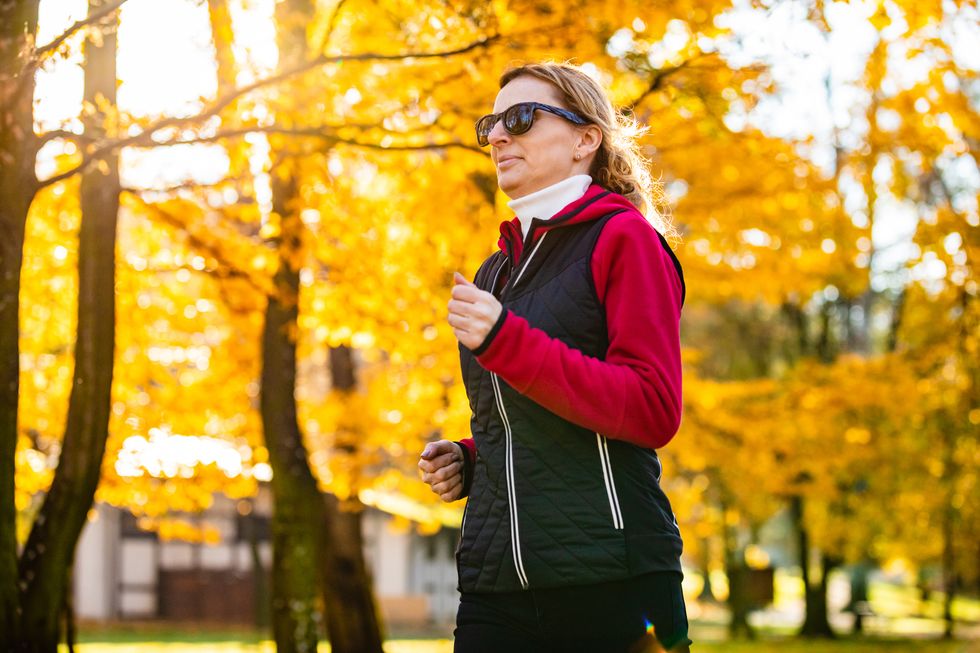It's hard to ignore all the pink going on in October.
Even without breast cancer awareness month, as women, we're all aware of breast cancer. Either we've had it ourselves, have had a scare, have a friend or relative with it or have had reason to worry (like having a genetic mutation, dense breasts or a strong family history).
One of the other risk factors for breast cancer—one we can't control—is getting older. The risk increases with age, and the majority of breast cancers are diagnosed in women over 50. According to breastcancer.org, if you are currently 50 years old, the probability of developing invasive breast cancer in the next 10 years is 2.31% (or 1 in 43). Keep in mind, though, that your risk may be higher or lower depending on factors like family history, race/ethnicity, reproductive history and other influences.
But you are not powerless! There are things you can do to lower your breast cancer risk:
1. Curb your alcohol intake
Why it's important: Compared to women who don't drink, if you drink two or more alcoholic drinks daily, you're 50 percent more likely to develop breast cancer over the course of a lifetime. That's because alcohol can increase the levels of estrogen (and other hormones) that are associated with certain types of breast cancer. It might also have an effect on your body's ability to absorb some nutrients, like folate (a B vitamin). Low levels may play a role in developing breast cancer, according to the American Cancer Society (ACS).
Recommendations: The ACS suggests having no more than one drink per day. And if you don't drink, don't start: Women who don't drink alcohol at all have the lowest risk. One drink is defined as 12 ounces of beer, 5 ounces of wine or 1.5 ounces of 80-proof (40 percent alcohol) liquor.
2. Manage your weight
Why it's important: Having more body fat (especially after menopause) can raise your estrogen levels, which raises the risk of certain types of breast cancer. Being overweight can also raise insulin levels, which have been linked to breast cancer.
One large study found that women who gained 20 pounds or more after menopause had an 18 percent higher risk of breast cancer compared with those who gained little or no weight after menopause, according to the Susan G. Komen Foundation.
Recommendations: Losing weight after menopause may help lower the risk of breast cancer according to research. While this may be more challenging after menopause, you can do it by increasing your activity, eating nutrient-rich foods, getting enough high-quality sleep, eating mindfully and controlling your portions. Read more about fighting menopausal weight gain with exercise and diet.
3. Don't Smoke
Smoking is linked to a higher risk of breast cancer in younger, premenopausal women. But research also demonstrates a possible link between exposure to heavy second-hand smoke and the risk of breast cancer in postmenopausal women.
Recommendations: If you smoke, quit! It can be challenging, but there are plenty of resources to help, like the American Lung Association, medicines available in pills, patches or gum, acupuncture and meditation and peer/family support.
4. Get Active
Regular exercise has been shown to lower breast cancer risk by 10 percent to 20 percent. Its power is in how it can regulate hormones like estrogen and insulin (which can fuel breast cancer's growth), as well as keep you at a healthy weight. Exercise also keeps your immune system healthier.
Many studies have linked exercise with a lowered risk of recurrence (when the breast cancer you were treated for returns).
Recommendations: The ACS and other experts recommend about four to five hours of moderate intensity exercise each week, which includes brisk walking. But even a small amount is better than none. Take note: You must keep it up. Researchers found that these risk-reducing benefits stop working if you stop exercising.
5. Be Mindful of Hormone Therapy
Yes, it can help with hot flashes, night sweats and other bothersome symptoms, but some forms taken during menopause (like those that include both estrogen and progesterone) can raise the risk for breast cancer if you take them for more than five years, which is why many experts recommend taking the lowest effective dose for the shortest amount of time. Read about the latest study on hormone therapy and breast cancer.
And finally …
Get tested, please! My breast cancer was found during my first routine, screening mammogram. I was just 34 with no family history, no bad health habits, no reason whatsoever to suspect that anything could be amiss.
I urge every woman I know to followthe recommendations for screening. It can save your life.
This post originally appeared on mysocalledmidlife.net.






